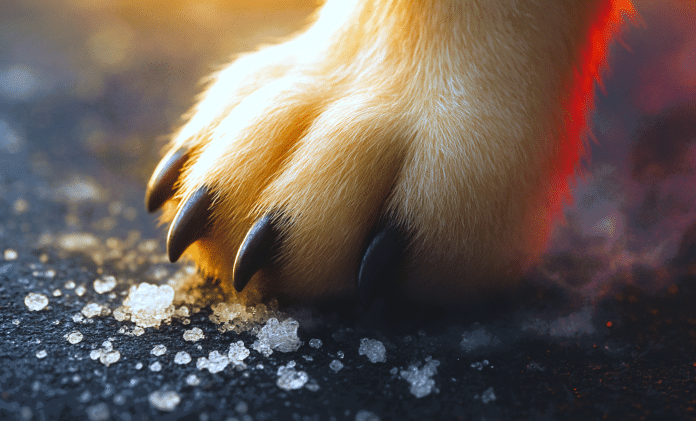Richmond, VA – As the first icy conditions of the season move into Virginia, veterinarians are urging pet owners to protect their dogs and cats from more than just the cold. The road salt and de-icers used to combat slick streets and sidewalks can burn paws, irritate skin, and lead to toxic reactions when pets lick or ingest them.
Most de-icing products contain sodium chloride, calcium chloride, or magnesium chloride, chemicals that melt ice but are harsh on paw pads. Even short walks on salted surfaces can lead to redness, cracking, or burns. When pets lick their paws afterward, they may swallow harmful residues that can cause vomiting, diarrhea, excessive thirst, and lethargy. In more severe cases, exposure may result in seizures or kidney problems.
Veterinarians also warn that many commercial ice melts contain industrial contaminants or heavy metals, increasing the risk of poisoning after repeated contact. Small dogs, older pets, and those with sensitive paws are most likely to experience irritation or chemical burns.
To reduce risk, veterinarians recommend rinsing your dog’s paws with warm water after every walk and drying them thoroughly. Applying a paw balm or wax before heading outdoors can create a protective layer, and trimming fur between the toes prevents buildup of salt or ice. Booties can also offer solid protection for pets that tolerate them. Around homes and driveways, pet owners are encouraged to use chloride-free, pet-safe ice melt products.
With temperatures dropping below freezing and black ice warnings in effect across central and northern Virginia, animal care experts say it’s important to stay alert for limping, licking, or reluctance to walk on salted areas. Even small exposures can lead to discomfort or more serious reactions.
As Virginia enters its first stretch of ice and frost, veterinarians remind owners that the real winter danger for pets may not be the chill in the air—but the chemicals spread to fight it.





